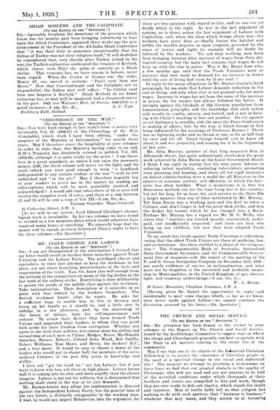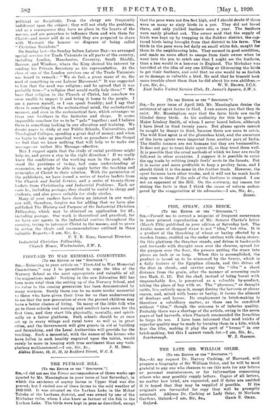THE CHURCH AND SOCIAL SERVICE. (To THE EDITOR OP THE
"SPECTATOR."] SI11,—My attention has been drawn to the review in your columns of the Report on The Church and Social Service. issued by the Archbishops' Committee to suggest ways in which the clergy and Churchpeople generally can beat co-operate with the State in all matters relating to the social life of. the community.
May I say that one of the objects of the Industrial Christian Fellowship is to arouse the conscience of Christian people to the need of a spiritual change in our social and industrial life ? The moment we attempt to proclaim a programme on these lines we find that our greatest obstacle is the apathy of Christians, who will not read and are not anxious to be told of the wretched conditions under which thousands of their brothers and sisters are compelled to live and work, though they are ever ready to dole out charity, which stands for insult and injustice. Men of feeble faith tell us that religion has nothing to do with such matters, that "business is business," whatever that may mean, and they accuse us of becoming political or Socialigtie. Even the clergy are frequently indifferent upon the subject: they will not study the problems, and as a consequence they have no place in the hearts of the masses, and are powerless to influence them and win them for Christ—and never will do so until they are prepared to share with Westcott the honour or disgrace of being called " Christian Socialists."
On Sunday last—the Sunday before Labour Day—we arranged special services for Trade Unionists in all parts of the country, including London, Manchester, Coventry, South Shields, Barrow, and Windsor, where the King showed his interest by sending his Private Secretary as his representative. At the close of one of the London services one of the Trade Unionists was heard to remark : " We do feel, a great many of us, the need of something in our Labour Movement." It was suggested to him that the need was religion; and lie agreed that it was probably true—" a religion that would really help them!" We have that religion in the Church of Christ, but somehoW we seem unable to impart it and bring it home to the people. I am a parson myself, so I can speak frankly; and I say that there is something in the ecclesiastical mind, the ecclesiastical manner, and even in the ecclesiastical face, which estranges us from our brothers in the factories and shops. It seems impossible somehow for us to be "pals" together; and I believe there is something lacking in our education and training. We devote years to study at our Public Schools, Universities, and Theological Colleges, spending a great deal of money; and when we begin to take up practical work as preachers of -the Gospel we find that we know nothing that will help us to make our message—or rather His Message—effective.
May I suggest again that the study of social problems niight help us, and prove a step in the right direction ? It we really knew the conditions of the working man in the past, under- stood the problems of to-day, had some understanding of economics, we might be able to apply better the teaching and principles of Christ to their solution. With the permission of the publishers, we have issued a series of twelve leaflets from The Church and Social Service, and a series of twenty-three leaflets from Christianity and Industrial Problems. Each set eosts is., including postage; they should be useful to clergy and students, and also prove suitable for study circles.
Many of your readers have shown an interest in our Work; you will, therefore, forgive me for adding that we have also published The History and Purpose of the Industrial Christian Fellowship, which may be obtained on application for 4d., including postage. Our work is theoretical and practical, for we have our agents in the industrial centres throughout the country, trying to interpret Christ to the masses, and to prove in action the ideals and recommendations outlined in these valuable Reports.—I am, Sir, &c., Church House, Westminster, S.W. 1.



































 Previous page
Previous page